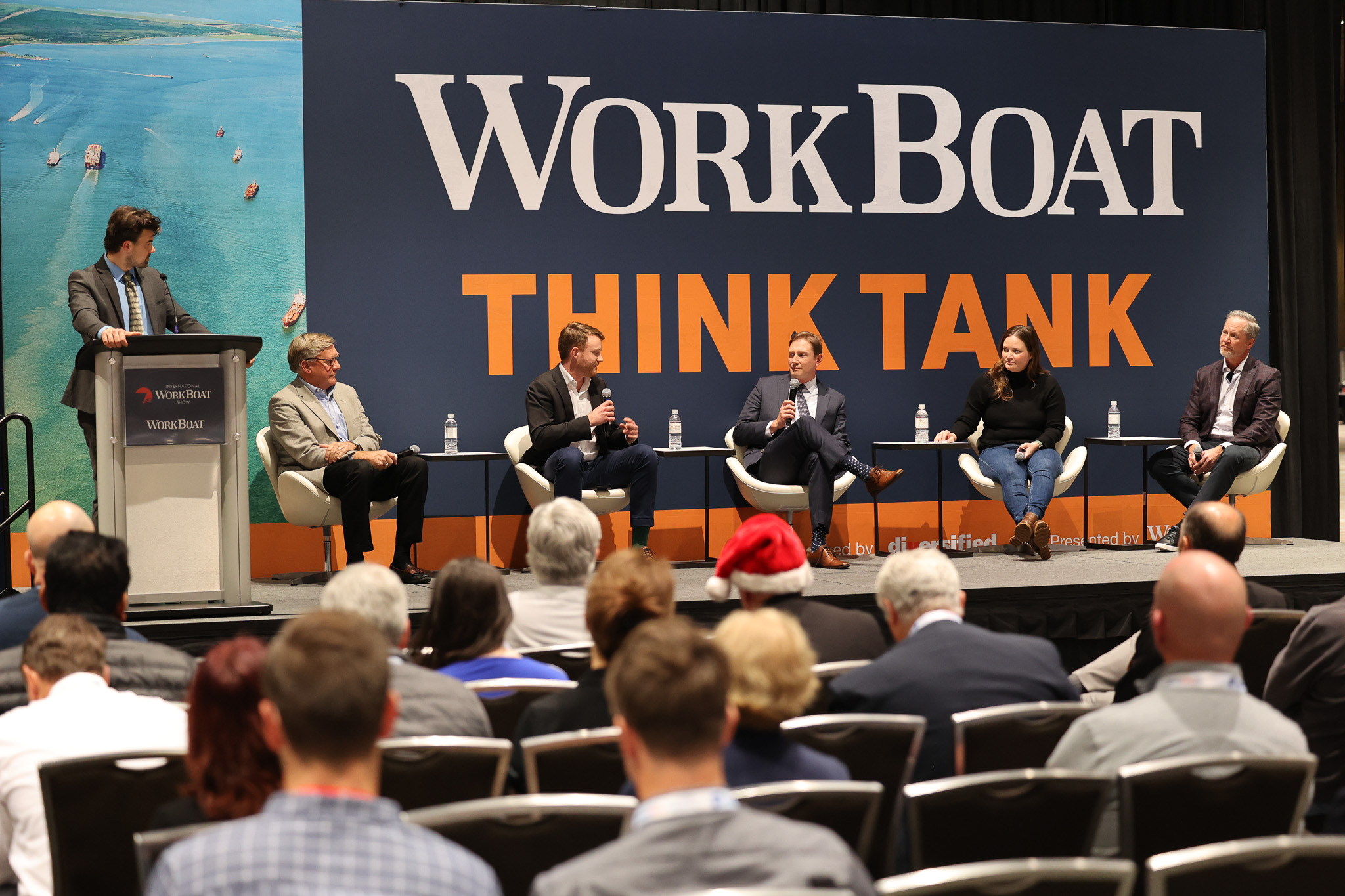Stability and predictability are two hurdles the U.S. offshore wind industry must clear to build out the new fleet it needs, panelists said at the International WorkBoat Show in New Orleans Thursday.
“For us, the biggest challenge is seeing these projects permitted and moved forward,” said William Hanson, senior vice president for market development with Great Lakes Dredge and Dock Corporation, which is building the first U.S.-flag subsea rock installation vessel for the U.S. wind market.
“We knew being first to market with a Jones Act-compliant rock vessel would be attractive,” said Hanson, explaining how Great Lakes studied its plan for several years before having the ship built on spec at Philly Shipyard. The vessel will be working in 2025 on Equinor’s Empire Wind turbine project off New York Harbor, and has other work lined up into 2030, said Hanson.
After that, “will it be as busy?” Hanson added. “We’ll see.”
The Biden administration’s march toward a goal of 30 gigawatts of offshore wind energy by 2030 has developers and the Bureau of Ocean Energy Management busy, with the agency planning for projects from New England to the Carolinas.
“The key is going to be establishing durability for this industry,” said John Begala, the Business Network for Offshore Wind’s vice president for federal and state policy. Administration planners “need to stick by their 16 COPs (construction and operations plans) by the end of their term. Then we can say this industry is on a glide path to success.”
It’s critical to make sure all sectors of the U.S. maritime industry can share in that future, said Aaron Smith, president of the Offshore Marine Service Association.
“Look at the show. Anyone can tell you it’s buzzing, it’s packed,” Smith told the standing-room audience for the panel titled “U.S. Shipbuilders, Mariners and Operators Role in Offshore Energy.”
There is a need to “make sure everyone has a level playing field,” said Smith. “If not, that whole hall is going to be unhappy in a few years.”
“When a foreign flag vessel is operating in U.S. waters, they can basically hire whoever they want,” said Smith, who group advocates for tighter enforcement and new legislation to regulate how oil and gas and wind developers can use foreign vessels on projects. All companies have “investors and boards to answer to,” and won’t spend to hire U.S. mariners unless the rules compel them, he stressed.
“The problem comes with exceptions and enforcement that have evolved over time, said Robert Vosbein, executive vice president of Harvey Gulf International Marine.
Crewing an offshore service vessel with a U.S. mariner can cost $700 a day, compared to using a foreign national who works for $100 a day, said Vosbein.
“These are not exaggerations,” Vosbein added. “It’s a completely unlevel playing field.” Smith cited wind developers’ help-wanted postings on LinkedIn social media pages that explicitly call for non-U.S. mariners.
“We’re very heavily regulated” and foreign vessels and crews need not conform to the same U.S. rules, said Vosbein. It is “incredibly more difficult” in comparison for a U.S. company to simply move containers on an offshore service vessel, he said. The prospect of developers using foreign flag vessels is a disincentive for U.S. companies to invest in new vessels for the wind market, Vosbein and Smith said.
For U.S. shipbuilders “offshore wind is a generational market,” said Paula Zorensky, vice president of the Shipbuilders Council of America.
Demand will create the market, but the industry needs “stability and predictability…and on-time budgets,” said Zorensky. Much of that certainty needs to come from the government and Customs and Border Protection, with its interpretation of Jones Act questions and related regulations, she said.
The Shipbuilders Council has joined OMSA and other U.S. maritime groups in supporting the Offshore Workers Fairness Act (H.R.6728) in Congress which they say will eliminate some of the disparities in competition. The legislation is “a small part of the certainty our industry needs,” said Zorensky.
“There’s a reason foreign companies want to come here,” to enjoy the benefits of a strong economy and security, but to also “save a little on the back end” with costs, said Zoernsky.
That must no come at the expense of undermining the Jones Act and U.S. shipbuilding, at a time when the nation is looking at a new era of maritime competition in the Pacific with China, she said.
“Ninety-two countries around the world have cabotage laws just like the U.S.” with its Jones Act, said Zorensky.




